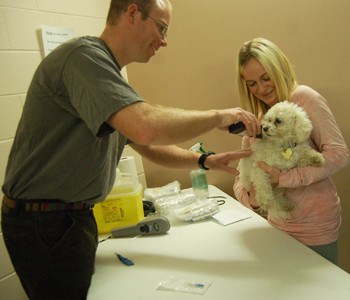Owners worried about pets safety implanted a small microchip to ensure their dogs or cats return home.
The Thunder Bay and District Humane Society on Rossylne Road held its annual Chip-a-thon on Saturday. More than 30 people came to the humane society to have a small pinpoint-sized microchip implanted into the backs of dogs and cats.
The chip contains personal information about the pet’s owner. A veterinarian injected the chip into the back shoulder blades of the animal. Only a specific scanner can read the 10-digit ID code by passing over the animals’ back. The human society offered a reduced price for the chip normally, $50 to $60, but sold it for $35 with proceeds going to the humane society.
Amanda Gregory brought in three of her dogs to inject the chip. The small dogs didn’t move too much while a veterinarian injected a small needle. The dogs gave a small yelp but remained calm. Gregory said she understands the importance of getting an ID code to identify her dogs.
"If I ever lose them I’ll get them back," Gregory said. "I’m getting them done here because it’s cheap."
Alec Smith, a veterinarian with Northwester Veterinarian Hospital, said the number of people bringing in their pets to receive the chip increased since he first started his career in 2001.
"I think they are growing because of their great benefit," he said. "They reduce the time a pet is lost, so I think they are a wonderful thing in animal health care.
Smith said wildlife studies commonly use chips to monitor and track animals. He said it is a simple procedure and causes little discomfort to the animal.
"Basically we use a very sharp needle, much like we would for an injection like a vaccination, and the microchip is about the size of a grain of rice," he said. "With a good hold and a scratch from mom, the pets are pretty good."
Sue Saretsky, a volunteer with the Thunder Bay and District Humane Society, said the chip is better than regular licenses because the humane society can scan the animal to know who they are. After volunteering with the humane society for 11 years, she said she sees more people coming to have the chip implanted into the animals every year.
This quicker method of tracking down the owner of the animal means less time spent at the humane society, she said.
"it is perfectly safe," Saretsky said. "My cats were microchipped twice by mistake. I adopted two cats from the shelter here, took them to my vet and forgot they already got microchips. So they have two chips in them."
Saretsky said after the injection, veterinarians asked the dogs and cats not move too much to make sure the chip doesn’t shift.
Sign in or register
- Messages
- Post a Listing
- Your Listings
- Your Profile
- Your Subscriptions
- Your Likes
- Your Business
- Support Local News
- Payment History
Registered Users
Already have an account?
New Users
Create a free account.




